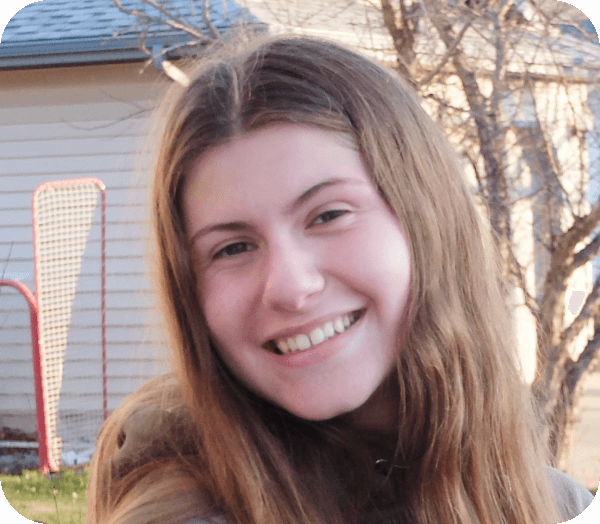
Robyn | Fibromyalgia & Chronic Pain
How Robyn manages Fibromyalgia & Chronic Pain with Bearable I started using Bearable because someone told me about it several years ago, so I thought I’d

Interview & article by Jesse Driessen.
Published 7th June 2024.
Kayleigh lives with Dysautonomia, Postural tachycardia syndrome (PoTS), Mastocytosis, Anxiety, and Depression. We spoke with her over Zoom to find out how Bearable is helping her to manage her symptoms, aid with the diagnosis process, and come to terms with changes in her life.
Just to kick things off; do you want to let me know how long you’ve been using Bearable and then also the different health conditions that you’re managing with been Bearable as well
Yeah, I’ve been using Bearable for about three months. I have Mastocytosis and Dysautonomia and depression and anxiety as well. Mastocytosis is when your body produces too many Mast cells and it affects my whole system, my organs, everything. It can be very mild or severe and I’m somewhere in the middle. It’s moderate.
Dysautonomia is an umbrella term for lots of conditions. I have PoTS as well, which is also a form of Dysautonomia. Your heart and brain struggle to communicate properly about changes in blood pressure when you stand up or sit down or lay down.
I use the term Dysautonomia because Mastocytosis also falls under Dysautonomia and I have some chest pain from the two conditions. It's a little complicated but that's what I have.
That makes sense, thanks for explaining. Would you say there are specific symptoms of those conditions that are more severe?
Yeah totally. Lots and lots of fatigue. I’m always tired. I take lots of naps and when I wake up I don’t feel rested. Stomach issues, digestion issues, nausea, acid reflux. The abdominal pain is the worst though.
Oh Mastocytosis – I’m sorry I forgot to mention this – it comes with anaphylactic allergic reactions and you don’t really know what triggers them. So that is definitely a challenge. I have two epipens on me at all times because – whilst I have an idea of what my triggers might be – who knows if it could be something random one day. That’s just that’s probably the most severe and worrying symptom I guess.
You’ve been using Bearable for about three months. Do you want to tell me how your health was – or how you were managing your health – before you were using Bearable?
I was using the health app on my phone and I was really only using it to track all my medications but it was not doing much because you can’t. There’s not many things you can like put in there. If you want to track your symptoms it’s kind of complicated and not good for in-depth tracking at all. So I wasn’t really tracking much. I would sometimes write things down in my notes but that’s not a very reliable system either.
Then I saw the ad for Bearable and I thought “Wow, this looks definitely like something that would help”. I downloaded it and I started using it every day and now I actually have something to show to my doctors and the health professionals that help me. I can show them how I’m feeling based using Bearable. How my symptoms change and the things that seem to affect my symptoms. It’s so great that you can track the weather in Bearable too, that’s awesome.
Honestly the best thing about Bearable is just being able to track my symptoms. Being able to track it in-depth and have something to show somebody who needs to know. It totally helped me get control of and find ways to manage my health.
The topic of native or generic health apps is interesting. For so long it felt like they were designed just for people who are already healthy. They’re not really apps for people with illnesses or health conditions.
Apple Health has introduced some sort of mental health and symptom tracking but I still get the impression it’s not really designed for people with complex health issues. It’s definitely problematic. So I’m glad to hear that Bearable is filling that gap and addressing that need.
Is there anything else you’d like to tell me about how bearable has helped you to prepare for doctors or medical appointments?
I don’t have Bearable Premium but it still works fantastically without a subscription – like looking at weekly and monthly trends in symptom severity scores. I don’t know what the chart is called but it’s fantastic.
I’ve actually shown it to my doctor – one of my specialists – and even she thinks it’s fantastic too because it’s very hard to collect that much symptom data yourself (without an app). So it really helps me actually know what I’m going to talk about (in an appointment).
When I go to doctors I struggle with remembering everything I need to say to them. Actually being able to talk about my concerns and having the option of showing them my progress or my feelings [in Bearable]. It helps me prepare for sure.
It’s good to hear that they’re receptive to seeing reports because I’ve heard from other members of the community – who’ve attempted to show reports to their doctors – and sometimes they’re just not interested at all. So I’m just glad you’re working with medical professionals who want to look at your symptom data – that’s definitely positive.
If you had to pick one thing that Bearable helped you with the most, what would you say that is?
Well – in my opinion – it helped me get diagnosed with PoTS and Dysautonomia because I didn’t really even know about Dysautonomia. Then, I was talking to a friend who has it. I was showing her the app, showing her my symptoms and my heart rate. She’s like “this is really high, like chronically high and – you know – like how it is for PoTS.” That definitely helped me a lot.
I went to a physiotherapist to do a tilt table test and – because I went on a really good day my heart rate wasn’t as severe as normal – I showed him my heart rate readings in Bearable (to help him understand how severe they are on bad days).
Outside of experiences with medical professionals, has Bearable had any sort of impact on how you manage your health or even just feel about your health?
Yeah, definitely. I feel more in control. Honestly, like I have a way to actually put it all down and actually track my symptoms and see the correlations.
Also because I’m quite new to having a chronic illness. It’s only been about six months. Knowing that there are people out there who also have experienced something like I have and that they also use this app.
If I need to reach out to someone, the community is there. Because Bearable’s designed specifically for chronically ill people - which is amazing because most things aren't - it gives me peace of mind that I'm not alone in this.
I’m really happy to hear that. That’s one of the things we want to try to do even more with. We have a Discord community and a Reddit community but we definitely want to connect people in the community because some of the support that’s available is amazing.
One of our favourite things – as a team at Bearable – is seeing people within the community just helping each other on tough days, giving a bit of advice, and just supporting one another.
Has Bearable helped you to find any useful – or even unexpected – triggers?
Yeah the weather! I had no idea (how much it impacted my health) and it totally changed how I see my symptoms and even my mental health too.
Of course, I knew people can have a change in mental health with the weather but I didn’t really even think about how it might affect me at all. Then I started looking at it and I’m like “wow it’s cloudy today and I have a lower mental health rating than when it was sunny”. That really helped. With my symptoms – especially the fatigue and dizziness – the weather tracking has really been a game-changer for sure.
Food tracking is really good because I’ve discovered that some food products that contain gluten trigger some symptoms for my stomach. I wouldn’t even have thought about that because I got tested for celiac disease and I did not have that. So I totally didn’t think that it would be a factor impacting my health.
That seems to be quite a lot of people’s aim when they initially use the app. They want to sort through the minefield of everything that could be causing issues and start connecting the dots.
Would you say there’s anything else that you maybe want to touch on that Bearable’s helped with?
So, before – like way before – all of this started, I did Ukrainian dance. I was dancing four times a week and was really healthy. All of a sudden all this happened (with my health) and I had to quit. It was honestly devastating. I had a dream to be in this very specific ensemble that I had been dancing under for my whole life. I got there and I did my first performance and it was probably one of the best days of my life. Then a few months later this all happened and I had to quit. It was very sad for me.
I had a lot more mental health issues than I’d had previously. I’ve had Anxiety and Depression for a few years but it kind of all came back because I couldn’t let my feelings out through physical activity. I just couldn’t do much physical activity anymore because of the symptoms I was experiencing. So there wasn’t any way that I could let it out.
The mood tracking tools in Bearable totally helped me realise that this was not not good for me. I mean – I knew it wasn’t good – but it was not good mentally and then my mood rating for the day was slowly declining and all my symptoms were quite severe. Mental health totally has a correlation with your (physical) health as well. Even if you have a chronic illness or not. I found that if I was having a bad mental health day, I was probably also having a bad physical health day with my symptoms too.
That helped me because one of my doctor's is very supportive with my mental health. She helped me get some new medication and bring me back up to a good place mentally. I showed her the mental health correlation with my physical symptoms. So Bearable helped me to get a clearer picture of what's going on (with my mental and physical health).
Related to your own experiences as a dancer; a lot of the members of the community I speak to have their lives derailed by chronic illness.
Recently, I was speaking to somebody who was on the track to being an Olympic Athlete – a long distance runner – and she started suffering with ME/CFS basically and it just completely changed her entire existence.
Having to give up on a dream and completely readjust who you are just because you have this condition – that can’t necessarily be diagnosed or treated – it really sucks. I’m really sorry that you had that experience.
It sounds like maybe you’ve come to terms with it a little. Or that you’re making progress with it. Is that a fair assumption?
The decision to quit was so, so hard but now I definitely know that it was for the best. There’s a chance I can maybe go back – we’ll see – but that’s not that’s not something I need to worry about right now. But yeah, I’ve come to terms with it.
Do you have any advice for other people who live with your unique mix of chronic health conditions? Or maybe for anybody who’s thinking about using Bearable?
Well, for me, Bearable totally changed my health journey and how I track it all. Honestly, even if people don’t have a chronic illness I think it would be great to use. Just because everyone has a headache once in a while or stomach ache once in a while.
Even if it’s not something to worry about, I think it’s nice to track it at least. Because, if it becomes something that needs to be addressed, it’s nice to have that pre-information. When I had to start this journey I had nothing to show (my doctor). All I could tell them was “my stomach hurts” there was nothing for them to go off of.
It’s good to track your mood whether it’s unbearable – or something else – even if you don’t have a mental illness or anything like that, it’s just very good to track mental health always.
For people who might have something like I have – of course every case is different – it’s definitely a game changer for my health. I have something to show medical professionals. I have peace of mind for myself. I’m more in control and I’m starting to learn what my triggers are. Or how I feel day-to-day. Yeah it’s totally worth it.
Like I said before, I use the free version of Bearable and it's so good even without a subscription. I've been considering purchasing it but even without Bearable Premium, it's so helpful. It's such a great tool and definitely something that I would recommend to everyone, chronic illness or not.
It’s actually really nice to hear that you’re getting value and getting some use out of Bearable even without having to pay anything for it. That’s how we designed it. We wanted it to be useful without having to pay money. Tons of people with chronic health conditions have limited income because of their health. That’s why they’ll always be a free version of the app.
You’ve mentioned feeling a bit more in control since using Bearable and you’ve also mentioned having a clearer view of certain things – mood trends, triggers, etc. Is there anything else you’d like to add?
Honestly just having a consistent way to track my symptoms is so helpful. Before I was trying to write it down in my notes app. Or write it down on a piece of paper – and that’s that’s okay – but for me, it was really hard to be consistent. Or to do it at certain times of day.
With Bearable it’s good because I can do it twice a day-ish and (the mid morning and evening). So it’s always tracking how I’m feeling at that time every single day. It’s so much easier. I can look at my progress and seeing what medication is helping or if a specific physio plan is helping. My good days and bad days.
I’m still in school, so it’s even nice to show my principal because she’ll talk to me about “missing lots and lots of school” because of my health and (before Bearable) I had nothing to show her. There was no diagnosis and I finally showed her Bearable one day and I’m like “Look at all this (severe symptom data). I’m not lying. I’m not just skipping school.”
It's just nice to actually have something physical to represent how I'm feeling and how my health changes.
I always feel so frustrated that it’s necessary to show somebody an illustration of how you’re feeling, that they wouldn’t just take your word for it. But I am glad that you have a principal who was – like your doctors – willing to look at your data and say “This person isn’t lying to me. They’re dealing with real and severe health conditions.” That’s reassuring.
Is there anything else – other than Bearable – that you’d like to suggest to people? Any other apps, other resources, anything else you’d recommend to people who’re about to go on the journey that you’ve been on with your health?
One app that I used to use quite often is called How we feel. It’s specifically to track your emotions and how you’re feeling throughout the day. If that’s what someone is looking for, that’s totally what I recommend and you don’t need to pay for it either.
I love apps like that. You don’t have to pay, or you have the choice to pay, and it just upgrades your experience like you can still use it very well without paying. I’m back to Bearable now but that’s another thing that I totally love about it because the subscription is optional. I know you mentioned that’s what you guys wanted to do and you totally totally hit the mark.
We’ve got about five minutes left, is there anything else that we haven’t touched on?
I’ve said it before but it’s 100% worth it to take five minutes a day – or five minutes twice a day – to log your symptoms. You can choose what you want to track and you can hide things you don’t want to track. There’s so many choices. The experiments too. I tried one, the vegan one I think. It was really cool because – I’m not a vegetarian or vegan but – it was really interesting to see how that way of eating impacted my health.
Note. The names and images used in this article have been used with the permission of the interviewee.

How Robyn manages Fibromyalgia & Chronic Pain with Bearable I started using Bearable because someone told me about it several years ago, so I thought I’d

How Rae manages Mental Health & ADHD with Bearable. I started using Bearable because my mental health was tanking as a uni student during COVID lockdowns.

How Laura uses Bearable to manage Long Covid. I started using Bearable because I have had long covid for two years now. In the beginning